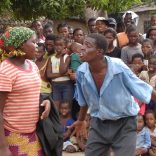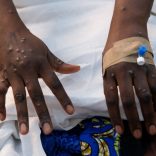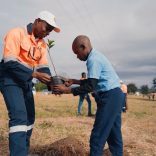Mozambique marks a decade free of landmines - HALO Trust
There is corruption in the distribution of humanitarian aid in Cabo Delgado – DW

FILE - Illustrative photo. [File photo: DW]
João Mosca reveals that the displaced are involved in a corruption scheme, and denounces the government for preventing NGOs distribute support, a role which is allowed only to public institutions and the Army.
It is estimated that terrorism in northern Mozambique has so far internally displaced some 800,000 persons. The Government of Mozambique lacks resources to adequately support this group, but private, national and international associations and non-governmental organizations have been providing humanitarian assistance, mitigating the executive’s difficulties.
Over time, several phenomena have arisen in the camps that accommodate the displaced. Rural Observatory (OMR) researcher João Mosca says that, for example, some displaced families are registering to receive help more than once, with the aim of diverting products into a corrupt trading scheme.
DW Africa interviewed João Mosca.
DW Africa: In the current terrorism situation in Cabo Delgado, it is difficult to estimate the number of internally displaced people …
João Mosca (JM): The numbers of people officially designated displaced is higher than can possibly be, considering the population in Cabo Delgado, between both districts and localities. If we add the population that existed before the conflict and those who today say that they remain in their places, who were not affected by the conflict, the sum is much higher than the sum that these places have. This means that people are registering at more than one site with their families in order to receive more food than they would receive in the case of individual families. The same family can register at several sites in order to receive two or three times more food than that which they would be entitled. Hence, a whole business process can be generated, which is already taking place among the displaced themselves.
DW Africa: And how can this be resolved? For example, if there was a digital system in place, which in the current circumstances we believe to be practically impossible, this would be avoided. But in the absence of such conditions, how can you minimize this problem?

JM: Not only can it be [the case of] the same person registering at several sites, it can also be that people from the same family are registering at different sites. So, how to do it in these conditions is very difficult. However, locally I think that it would be possible if those distributing the resources pay more attention to those receiving it. And even among the community, they know very well who has the most resources and is trading in those goods. Only with local knowledge, being on the ground, but it must also be said that the people who distribute, the Army that does the distribution in some areas must be aware that they themselves must not enter into this business. Here, there is a multiplicity of interests and negotiations between people with different interests, who end up making commitments to each other, in the sense that we all win a little and we will make the most of it.
DW Africa: What about international aid?
JM: Mozambique has refused to allow international and national civil society organizations to distribute humanitarian assistance resources directly to the population. It means that the government requires that these resources be turned over to public institutions and the Army to carry out this distribution operation on the ground.
DW Africa: Are we talking about a kind of corruption that is taking place in humanitarian aid in Cabo Delgado?

JM: Absolutely. But not only on the part of the population, this type of business has been detected for some time. It is not unusual, because in other situations, for example, calamities, unfortunately very common in Mozambique, the public institutions themselves responsible for helping the population in conditions of strong environmental shocks, and now in a conflict situation, should be aware of the possibility of these phenomena appearing immediately in conditions of great instability and in places where displaced persons are hosted. This, in order to avoid this type of corruption that involves several people, and there are compromises between persons, and [there are] pacts of silence and interests of a very large group involved in a chain. It is a very generalised situation.












Leave a Reply
Be the First to Comment!
You must be logged in to post a comment.
You must be logged in to post a comment.